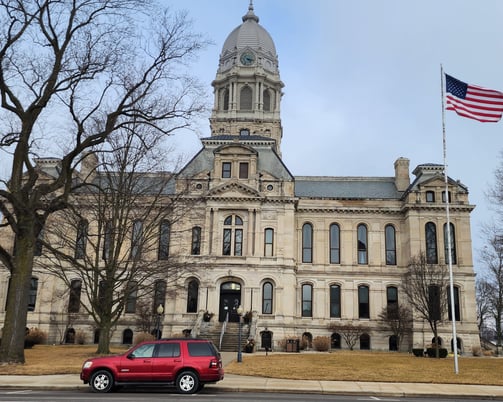REPORT
A "Rae of Sunshine" in Every Heart!

“There will always be poor people in the land. Therefore I command you to be openhanded toward your fellow Israelites who are poor and needy in your land.”
Deuteronomy 15:11
Affordable Housing Strategies
For Kosciusko County
Report
Affordable Housing Strategies for Kosciusko County
Adequate and affordable housing is a crucial component of a thriving community, yet many residents of Kosciusko County face significant barriers in accessing this essential need. The current state of affordable housing in this region reflects a complex interplay of economic factors, population growth, and the existing housing stock that often does not meet the diverse needs of its residents.
Over the past few years, Kosciusko County has witnessed a steady increase in population, driven by both economic opportunities and a desire for a more suburban lifestyle. This growth, however, has not been accompanied by a corresponding increase in affordable housing options. The demand for housing has outpaced supply, creating an environment where many individuals and families struggle to find suitable living arrangements within their financial means. This situation has exacerbated the existing affordability crisis, making it difficult for residents to secure stable and safe housing.
Furthermore, the economic landscape of Kosciusko County presents additional challenges. Many jobs in the area pay wages that do not keep up with the rising costs of living, further limiting residents’ access to affordable housing. The existing housing stock, while varied, often skews towards higher-end options, which can alienate lower-income households seeking affordable places to live. This mismatch between income levels and housing availability forces many individuals and families into substandard living situations or pushes them out of the community altogether.
As such, understanding the current affordable housing landscape in Kosciusko County is critical. It highlights the urgency of implementing effective strategies designed to enhance access to affordable housing. Addressing these challenges is not merely an economic necessity; it is fundamental to fostering community well-being and stability for all residents in the region.
The Affordable Housing Strategies for Kosciusko County study emphasizes the importance of collaborative governance—bringing together local governments, nonprofits, and private sector partners to address the housing shortage. Nonprofits play a vital role in bridging the gap between housing demand and available resources. Here’s how collaboration with nonprofits can enhance affordable housing efforts:
1. Nonprofit-Led Housing Development
Partnering with organizations like Habitat for Humanity, community development corporations (CDCs), and regional housing nonprofits can accelerate affordable housing construction.
Nonprofits can leverage grants and low-interest financing (such as HOME funds and Community Development Block Grants) to develop homes for low- and moderate-income families.
The county can provide land donations or reduced-cost properties to nonprofit housing developers to lower project costs.
2. Housing Trust Fund & Grant Programs
Kosciusko County could work with local foundations and nonprofits to establish a Housing Trust Fund to support affordable housing projects.
Nonprofits can apply for and administer grants, loans, or subsidies to help low-income residents with homeownership and rental assistance.
Collaborative funding models, where businesses and philanthropic organizations contribute, can ensure sustainable housing initiatives.
3. Supportive Housing & Wraparound Services
Nonprofits specializing in social services (such as homeless shelters, mental health services, and workforce training) can partner with housing providers to offer wraparound support for residents.
Programs could include:
Transitional housing for individuals and families facing homelessness.
Financial literacy and homebuyer education to ensure long-term housing stability.
Job training programs in partnership with local employers.
4. Policy Advocacy & Community Engagement
Nonprofits can play a key role in advocating for zoning reforms and policy changes that promote affordable housing.
Community-based organizations can engage residents in discussions on new housing developments, ensuring public buy-in.
Collaboration between nonprofits and local government can streamline processes for permitting and funding affordable housing projects.
5. Case Studies & Models from Other Areas
Some counties have successfully implemented "Community Land Trusts" (CLTs) in partnership with nonprofits to preserve long-term affordability.
Employer-Nonprofit Partnerships in housing (such as businesses working with housing nonprofits to provide workforce housing) have been effective in other regions.
Faith-based organizations can also contribute by developing housing on church-owned land or offering rental assistance programs.
Next Steps for Kosciusko County
Form a Housing Coalition: Bring together nonprofits, government officials, businesses, and housing experts to coordinate efforts.
Develop a Resource Hub: Create a centralized system where residents can access housing assistance, financial aid, and job training services.
Pilot a Joint Housing Project: Partner with a nonprofit to develop an affordable housing community and assess its impact.
with Nonprofits for Affordable Housing in Kosciusko County
Introduction to Affordable Housing in Kosciusko County
A study was conducted by the Myerson Consulting Firm partnered with Prosperity Indiana to produce a report for the Kosciusko County Community Foundation, located in Warsaw, Indiana. They were tasked to take recent housing studies that were focused on housing suited to attract a growing workforce and add these efforts by providing qualitative and quantitative data to support low- to moderate-income housing. If you wish to see a copy of the report, please click here.


Collaborative Governance




© 2025. All rights reserved.
We are dedicated to making a difference through charitable initiatives. Explore our mission and make a donation today. Your support helps us bring light to those in need. Join us in our journey to spread kindness and hope.
MAILING ADDRESS:
Rae of Sunshine Charitable Foundation, Inc.
3600 Commerce Drive #1010
Warsaw, IN 46580
EMAIL:
TOLL-FREE NUMBER:
(866) 688-4RAE (4723)
Rae of Sunshine Charitable Foundation, Inc.
Your generous gift will bring hope to many. Please, donate now!


